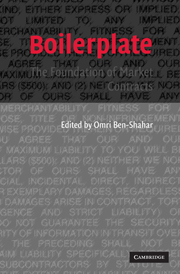Book contents
- Frontmatter
- Contents
- Preface
- List of Contributors
- PART ONE WHY IS BOILERPLATE ONE-SIDED?
- PART TWO SHOULD BOILERPLATE BE REGULATED?
- 6 Online Boilerplate: Would Mandatory Web Site Disclosure of e-Standard Terms Backfire?
- 7 Preapproved Boilerplate
- 8 “Contracting” for Credit
- 9 The Role of Nonprofits in the Production of Boilerplate
- 10 The Boilerplate Puzzle
- PART THREE INTERPRETATION OF BOILERPLATE
- PART FOUR COMMENTARY
- Notes
- Index
6 - Online Boilerplate: Would Mandatory Web Site Disclosure of e-Standard Terms Backfire?
Published online by Cambridge University Press: 02 December 2009
- Frontmatter
- Contents
- Preface
- List of Contributors
- PART ONE WHY IS BOILERPLATE ONE-SIDED?
- PART TWO SHOULD BOILERPLATE BE REGULATED?
- 6 Online Boilerplate: Would Mandatory Web Site Disclosure of e-Standard Terms Backfire?
- 7 Preapproved Boilerplate
- 8 “Contracting” for Credit
- 9 The Role of Nonprofits in the Production of Boilerplate
- 10 The Boilerplate Puzzle
- PART THREE INTERPRETATION OF BOILERPLATE
- PART FOUR COMMENTARY
- Notes
- Index
Summary
Editor's Note:In this chapter, Robert A. Hillman explores the merits of mandatory online disclosure of terms. Online disclosure can accord transactors the opportunity to read terms and respond to concerns about boilerplate either packed in the box or posted in nonconspicuous fashion on Web sites. Hillman's concern is that this increased opportunity to read might backfire. Actual readership of terms would not increase by much, but the opportunity-to-read might shield vendors from claims of procedural unconscionability.
Should the law mandate that Web sites disclose e-standard terms? This is a potential solution advocated by some to market failures that occur when consumers contract over the Internet. This chapter analyzes whether such mandatory Web site disclosure of e-standard terms is a potential legal backfire — whether it would produce results opposite from those intended.
By mandatory Web site disclosure, I do not mean a “clickwrap” presentation of terms, in which a consumer must click “I agree” or the like on a screen presenting the terms prior to the completion of a transaction in progress. Mandatory Web site disclosure would require a business to maintain an Internet presence and to post its terms prior to any particular transaction so that a consumer could read and compare terms without making a purchase at all.
The problem is not that mandatory Web site disclosure would increase the cost of doing business, which would be passed on to consumers in the form of higher prices.
- Type
- Chapter
- Information
- BoilerplateThe Foundation of Market Contracts, pp. 83 - 94Publisher: Cambridge University PressPrint publication year: 2007
- 7
- Cited by



